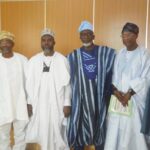The Chief of Defence Staff, Gabriel Olonisakin, on Wednesday described the use of cyber space as the most precarious challenge facing Nigeria today as a nation, adding that it has snowballed to cyber terrorism which is now the most unpredictable challenge the country is battling with.
Olonisakin, who was speaking through an Air Vice Marshal, Charles Oghonwen, from the Defence Headquarters at a workshop on the 2020 national cybersecurity strategy in Abuja, stressed that the cyberspace is being used to facilitate various terrorists’ activities.
- #EndSARS: ‘Some celebrities fuelled violence with fake news’
- #EndSARS: Northern Christians decry politicisation of protests
He said, “Cyberspace has been the main warfare after the lands, sea, air and space has no boundary and hence does not obey conventional rules in warfare. It remains open to exploitation buy state actors, organised syndicates, sects, criminals and terrorists. Cyberterrorism has become the most precarious challenge facing us today as a nation.
“The use of cyberspace to facilitate various terrorist activities, such as recruitment, training, propaganda, intelligence gathering and fundraising, cyber terrorism is now globally recognised as the fundamental threat to global security.”
Similarly, the National Security Adviser, Babagana Monguno, aligned with Olonisakin’s submission, adding that social media in particular is being used to incite violence in Nigeria.
Apparently reacting to the recent nationwide protests, Monguno, who represented by Aliyu Mohammed in the office of the Secretary to the Government of the Federation (SGF), noted that during the #EndSARS protests, social media was used to disseminate inflammatory comments.
According to him, “We are witnesses to the use of social media to disseminate subversive content to incite violence and heightened tension, causing unrest and sparking widespread looting and destruction across the country.”
The NSA underscored the importance of cyberspace but suggested that it should be regulated in order to achieve its usefulness, noting that it has helped in the enhancement of Nigeria’s national security, economic transformation and national development.
He stated, “Our country is currently at a turning point in its history, a significant section of our population of over 200 million people are young and entrepreneurs, we are also witnessing a rapid rise in our adoption of the internet in our daily lives”.

 Join Daily Trust WhatsApp Community For Quick Access To News and Happenings Around You.
Join Daily Trust WhatsApp Community For Quick Access To News and Happenings Around You.

